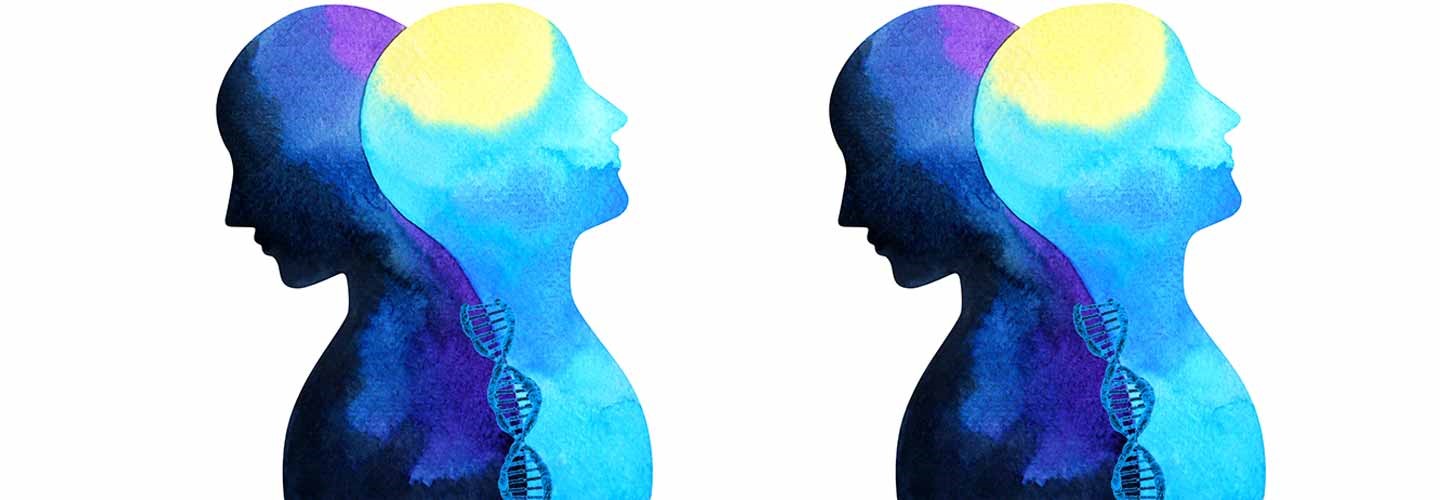The DNA of Emotional Health – Part 1 What is Personalized Precision Psychiatry?
- Home
- Blog

“Knowing yourself is the beginning of all wisdom”
– Aristotle, 4th Century BC
“In the twenty-first century… we are constructing a new epidemiology of self: we are beginning to describe illness, identity, affinity, temperament, preferences – and, ultimately, fate and choice – in terms of genes and genomes. The influence of genes on our lives and beings is richer, deeper, and more unnerving than we had imagined.”
– Siddhartha Mukherjee, M.D., 2016, AD
Reader, what’s in a name? When William Shakespeare first posed this question, what followed was some of the most memorable romantic language in the Western canon. That which we call a rose by any other name would smell as sweet… Now, I promise this space has not been transformed into a literature blog. But I do want to focus on that question for a moment—because in my field, the act of naming something holds deep significance. Shakespeare directed his question “What’s in a name?” toward a person, but I’m directing it toward something else: the naming of emotions, feelings, and states of being. Because you see, reader, it is only when we are able to name something that we can fully bring it into our consciousness. Naming something empowers us to reflect—and it empowers us to assess what may need to change.
One aspect of daily life that most people never consider is their emotional life and emotional health, and yet they are the foundation for everything we feel about ourselves and our lives. In fact, simply being able to name and acknowledge our emotional states is half the battle in the journey towards wholeness. The other half of the battle is where the real work lies. Once you can name an emotion, questions arise: What am I supposed to do with it? I don’t like how this feels… how can I feel different? Am I going to be stuck in this state forever? To do this work, you need every tool at your disposal. But emotions are heady things: what works for you may not work for your friend. Your emotional life is rooted in experiences, contexts, and biology that is entirely unique to you. How, then, can medicine or psychiatry begin to help? That’s exactly what we’ll be covering today and in the next few weeks, as we embark on a new blog series that will shine a spotlight directly on the DNA of your emotional health. Are you ready? Let’s dive in.
A Rose by Any Other Name… Your Emotional State is Unique to You
If naming emotional states is half the battle, the other half is embarking on a shared journey toward becoming whole. Given that helping others brings us enormous joy, you can imagine how joyful we become when people call our office seeking help—often for the first time in their lives—or when they’ve been treated elsewhere and are still not feeling well. But the emotions these individuals describe to us on the phone are absolutely impossible to generalize. Below are just a few of the recent calls we’ve received from individuals who are naming their emotional states and looking to get to the bottom of how to resolve them:
“I am experiencing a lot of anxiety and depression, I have never taken medication before and I am wondering if a professional opinion, a diagnosis, needs to be made.”
“I am calling because I am concerned I may have ADD/ADHD, I find it hard to focus and it affects my daily life, I want to do something about it”
“I am calling for my child who is lashing out and showing other behavioral problems, we want them to meet with a professional so we can manage what is going on”
“I am calling because I am interested in genetic testing, can you give me more information about it?”
“My family member is experiencing (paranoia, addiction, depression, anxiety) I am calling around for them, to help them find a doctor to help.”
“I am calling for a second opinion. I have been diagnosed with (bipolar disorder, borderline personality disorder) and don’t feel my (diagnosis is right) or (prescription is working)”
“I have experienced depression, feeling lethargic and sad, often moody, I want to do something about it because it is starting to hinder my daily life”
“I’m currently looking for a new psychiatrist and read Dr. Kehr’s blog and I am really interested in seeing him. I am looking for someone who won’t just give me medication. I want a doctor that treats the whole person.”
“I am interested in having my child come in for genetic testing. She has tried and failed a lot of medication. Can you tell me how to go about doing that?”
I’ve practiced psychiatry for 40 years, but the courage my patients display in these calls never ceases to amaze me. It takes guts to realize that, as just one example, your inability to get out of bed in the mornings—or at all—may be something more than lethargy. And it takes even more “heart” to bring that suspicion to the doctor’s office and begin to work together to heal it.
But let’s take that single example a step further. Once I see a patient who displays signs of depression, I assess them holistically. Using the Biopsychosocial Model as a guide, I not only take steps to uncover their internal and external lives, and their life stage challenges—but also their personal genome, through a simple cheek swab. The reason why is simple: “depression” is a blanket term that manifests in very different ways in my patient’s lives, and depending on their biology and internal and external factors, certain treatments may work while others do not. This sort of “n-of-1” treatment is known as Personalized Precision Psychiatry℠—and when it comes to really working through our emotional lives step by step, nothing is as effective in the long run as this type of approach
What’s in a Cheek Swab? How Your Genetic Code Can Unlock your Emotional Health… and So Much More
A fundamental tenant of my practice of Precision Psychiatry is to recommend genetic testing, through a simple cheek swab, to every single one of my patients. I then send the cheek swab to Genomind’s labs, and they provide an assessment of my patient’s mental health (and/or brain health) genes. In our new blog series, we’ll be focusing on newly assayed genes from Genomind, along with a new look at some of the earlier genes we covered, which will help to further clarify the amazing ways in which our genes can impact our emotional health—for good or for ill—and how we can in turn impact our genes through lifestyle changes, supplements, and medications.
To refresh your memory in anticipation of this new series of genes, I encourage you to watch the short video below, which explains succinctly how DNA and genes actually operate in your body—and how you can influence your genes just as they influence you
In our prior genetic series, we’ve focused on how personalized precision psychiatry pairs with genetic testing to allow your psychiatrist to prescribe the right prescription medication for you, as well as non-prescription supplements and lifestyle changes that can have a great impact on your wellbeing. We’ve even shed light on how genetic testing and precision medicine has changed my patient’s lives when they’ve come to see me after a long and fruitless search for help elsewhere. In this new series, we’re taking a closer look at how genes impact our emotional states—how they actually work inside our cells—and also how our ethnicity and other “genetic and epigenetic inputs” work to bring about states of being that are unique to preserving, protecting, and improving upon our emotional health.
Your Genes, Your Emotional Health: What Lies Beyond?
Reader, what’s in a name? This time, I ask in a more Shakespearian line of thinking. Your genes, like your name, are an inescapable part of who you are. But also, like your name, they don’t have to define you. You are so much more—and you owe it to yourself to find out what lies within each of the 32 trillion cells in your body and beyond, just waiting to be called into service to improve your happiness.
Related Information
- Learn about Genetic Testing
- Learn about Potomac Psychiatry
- Meet Our Doctors
- Contact Potomac Psychiatry
.png?width=144&height=144&name=Untitled%20design%20(34).png)



